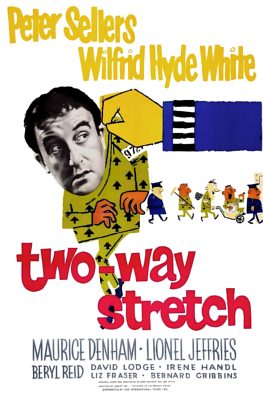Two-Way Stretch: Difference between revisions
m (1 revision imported) |
No edit summary |
||
| (8 intermediate revisions by 2 users not shown) | |||
| Line 1: | Line 1: | ||
{{Infobox film | {{Infobox film | ||
| image = TwoWayStretchPoster.jpg | |||
| image = | |||
| caption = Original poster | | caption = Original poster | ||
| director = [[Robert Day (director)|Robert Day]] | | director = [[Robert Day (director)|Robert Day]] | ||
| Line 75: | Line 71: | ||
* {{Allmovie title|51460}} | * {{Allmovie title|51460}} | ||
{{ | {{DEFAULTSORT:Two-Way Stretch}} | ||
[[Category:1960 films]] | [[Category:1960 films]] | ||
[[Category:1960s crime comedy films]] | [[Category:1960s crime comedy films]] | ||
| Line 86: | Line 81: | ||
[[Category:1960 comedy films]] | [[Category:1960 comedy films]] | ||
[[Category:British Lion Films films]] | [[Category:British Lion Films films]] | ||
[[Category:British comedy films]] | |||
Latest revision as of 07:11, 20 September 2024
| Two-Way Stretch | |
|---|---|
 Original poster | |
| Directed by | Robert Day |
| Written by | John Warren Len Heath Vivian Cox Alan Hackney (add'l dialogue) |
| Produced by | E. M. Smedley-Aston |
| Starring | Peter Sellers Wilfrid Hyde-White Maurice Denham Lionel Jeffries Beryl Reid David Lodge Irene Handl Liz Fraser Bernard Cribbins |
| Cinematography | Geoffrey Faithfull |
| Edited by | Bert Rule |
| Music by | Ken Jones |
| Distributed by | British Lion Films (UK) |
Release date |
|
Running time | 83 minutes |
| Country | United Kingdom |
| Language | English |
Two-Way Stretch, is a 1960 British comedy film, about a group of prisoners who plan to break out of jail, commit a robbery, and then break back into jail again, thus giving them the perfect alibi – that they were behind bars when the robbery occurred.[2] However, their plans are disrupted by the arrival of a strict new Chief Prison Officer.[3]
The film was directed by Robert Day from a screenplay by Vivian Cox, John Warren and Len Heath, with additional dialogue by Alan Hackney.[2][4] The film boasts a cast of characters played by, among others, Peter Sellers, Wilfrid Hyde-White, Lionel Jeffries and Bernard Cribbins.[5]
Plot
Three prisoners nearing the end of their jail sentences, "Dodger" Lane, "Jelly" Knight and "Lennie the Dip", are visited by a vicar seeking to find employment for them. He is actually "Soapy" Stevens, a conman, who proposes a large-scale diamond robbery. They will also all have alibis, because they will break out of prison, commit the robbery and then break back in. With the assistance of Dodger's girlfriend Ethel and Lennie's mother the trio smuggle themselves out in a prison van. The operation is almost foiled by the disciplinarian "Sour" Crout, the new chief prison officer. Everything goes to plan and the trio hide the diamonds in the Governor's office until they are released and can take them away. All goes well until the sack of diamonds is lost on a train. Stevens is recognised and arrested, but the others get away.
Cast
- Peter Sellers as "Dodger" Lane
- Lionel Jeffries as Chief Prison Officer "Sour" Crout
- Wilfrid Hyde-White as "Soapy" Stevens
- Bernard Cribbins as Lennie ("The Dip") Price
- David Lodge as "Jelly" Knight
- Irene Handl as Mrs Price
- Liz Fraser as Ethel
- Maurice Denham as Horatio Bennett, the Prison Governor
- Beryl Reid as Miss Pringle
- George Woodbridge as Chief Prison Officer Jenkins
- Edwin Brown as Warder Charlie
- Cyril Chamberlain as Gate Warder – Day
- Wallas Eaton as Gate Warder – Night
- William Abney as Visiting Room Warder
- Thorley Walters as Colonel Parkright
- John Wood as Captain
- Robert James as Police Superintendent
- Walter Hudd as Reverend Patterson
- Mario Fabrizi as Jones
- Warren Mitchell as Tailor
- John Glyn-Jones as Lawyer
- Arthur Mullard as Fred
- Ian Wilson as Milkman
- Edward Dentith as Detective
- John Harvey as Governor Rockhampton Prison
Production

The prison scenes were filmed at the South Cavalry Barracks at Aldershot, and the security van robbery at Pirbright Arch in the village of Brookwood in Surrey.[6][7]
Release
The film opened at the Warner Cinema in London on 11 February 1960 before going on general release from the 14th.[1]
Reception
Two-Way Stretch was the fourth most popular film at the British box office in 1960.
In The New York Times, Bosley Crowther gave it a positive review, writing, "the script by John Warren and Len Heath follows a straight line and is clever and full of good Cockney wit. Robert Day's direction is lively, in the vein of civilized farce, and the performances are delicious, right down the line," concluding, "Mr. Sellers is still on the rise."[8]
References
- ^ a b "Two-Way Stretch Group". Art & Hue. 2021. Retrieved 28 April 2021.
- ^ a b "Two Way Stretch (1960)".
- ^ "Two Way Stretch – review – cast and crew, movie star rating and where to watch film on TV and online". Radio Times.
- ^ III, Harris M. Lentz (17 May 2010). Obituaries in the Performing Arts, 2009: Film, Television, Radio, Theatre, Dance, Music, Cartoons and Pop Culture. McFarland. ISBN 9780786456451 – via Google Books.
- ^ "Two-Way Stretch (1961) - Overview - TCM.com". Turner Classic Movies.
- ^ "Reel Streets". www.reelstreets.com.
- ^ "bdca.org.uk • View topic – 1960 film "Two Way Stretch"". www.bdca.org.uk.
- ^ "Movie Reviews". The New York Times. 11 November 2021.
External links
- Articles with short description
- 1960 films
- Template film date with 1 release date
- IMDb title ID not in Wikidata
- 1960s crime comedy films
- British crime comedy films
- British black-and-white films
- British prison films
- 1960s English-language films
- Films directed by Robert Day
- 1960 comedy films
- British Lion Films films
- British comedy films